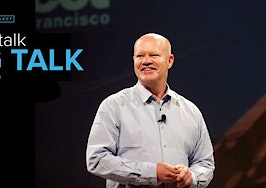In the movie Jack and the Giant Slayer, the towering giants descend from the beanstalks, provoking fear as they try to conquer the Kingdom of Cloister.
With a sudden ferociousness, data scientists are charging into the real estate village, rattling the industry by changing how people sell their homes.
Consider the well-funded techno house flippers — Opendoor, Knock and OfferPad — who together have raised a staggering $1 billion in funding. These are not mom and pops who staple signs on utility poles offering to buy your house, “call 1-800-Pay-Cash”.
Yes, whale-sized investments are pouring into flipping houses. But they are also funding smartypants data scientists and their algorithms for pricing houses and for finding homesellers. And these new companies are testing on- demand showings, instant offers, smart contracts and quicky closings.
This technology & flipping combo is compressing the transaction from the traditional timeline of 30 to 90 days to as little as 72 hours, rejiggering how homes will be sold in the future.
And it paints a sexy portrait for high-profile Wall Street and Silicon Valley investors, who are hankering to get into the $100 billion transaction side of the real estate business — commissions + mortgages fees + title costs.
Why do these new models represent such an opportunity?
First, new and improved home valuation algorithms are more exact in determining a house’s value. Early generations of Zestimates, as we knew them, were like flip phones — so yesterday.
Now, after 10 years of tweaking and improving its valuation tool, Zillow claims its median error rate is only 4 percent, and that is in heterogeneous markets. The techno flippers are operating in more homogeneous markets, where the Zestimate’s error rate is closer to 3 percent.
With more data sources, photos and user input, these new pricing models give sufficient confidence to some homesellers to unload their homes quickly (in a few days) without the uncertainty of a long, drawn-out process of listing their houses. Sellers receive all-cash offers in a few minutes from the techno flippers who are capitalized to do an endless number of deals.
It reminds me of Google when it not only came up with a better search engine than Yahoo but also introduced a scaleable and transformative business model that eventually trumped its competitors.
These polished pricing engines might be less compelling if homesellers had confidence in the current system, which many do not.
Not only is the sales process strung out over a painfully long period of time, but agent home pricing motives are sometimes suspect. We all know the criticisms: “some agents suggest an inflated price to get the listing,” or alternatively, “some agents lowball the listing price to get a quick sale.”
This is not how good agents behave, but consumer perceptions are skewed by the hucksters.
Another edge: These new companies are using data science to understand exactly when a homeowner is going to sell.
Copious data sets triangulate the homeseller — search behavior, demographics, social insights, consumer habits and purchase decisions. Sophisticated algorithms then seize the prey.
If Google knows my daughter is pregnant before she does, then these new tools will soon predict with a 99-percent accuracy rate when someone is ready to sell their house.
What does this mean for the real estate industry? Lots, but let’s focus on a few important things.
The home listing market suddenly faces a fierce new competitor (or partner) that some in the old guard underestimate.
And this time around — unlike the discounters, the portals, the IDX papier-mâché brokers, the Compasses and the Redfins — the sacrosanct home selling process is being turned on its head.
The techno flippers are not slashing commissions, not generating leads for others, not trying to control the data and not building an online consumer brand (for now). Instead, they promise convenience and pain relief for homesellers. An instant home transaction = nirvana.
Compressed transaction timelines are common in other sectors of our instant economy: we buy a car in an hour, receive an Amazon package in a day and book flights, hotels and auto services in minutes.
OfferPad co-founder and top producing agent Brian Bair’s goal is to make the homeselling “process as simple as possible.” He just landed $260 million in new funding to do so.
With the old model, there are “things I couldn’t do. I couldn’t tell [homesellers] exactly when their home was going to close and I couldn’t prevent the property from falling out of escrow 10 days before closing because the buyer’s financing fell through,” said Bair.
Critics argue that when it comes to homes, consumers do not place a premium on speed — but, actually, many might if acceleration is coupled with certainty.
Think about it — knowing you will close in a few days for a set price resolves the unknowns with the current process. For some, risking a lower price is worth the certainty. And this works best when you feel like you are dealing with a sophisticated service.
Uber charged the consumer more when it began, but the certainty and convenience outweighed the cost. Plus, the app seemed to know what it was doing.
These new models are all a bit different, and they are far from perfect. Stories are surfacing about sellers who are getting less than market value and paying hefty transaction costs — commissions as high as 13 percent, though the average is purportedly 6 percent to 8 percent.
On an Inman story last week, Arizona Realtor Jerry Murphy commented, “I tried OfferPad to get an offer on one of my listings. They offered $15,000 less than the offer we accepted on the property. That coupled with the exorbitant fees leave me asking what seller in their right mind would leave so much money on the table. You either really have to hate Realtors or be really desperate to do so.”
And for now, these startups can’t possibly do better than an ethical and qualified agent. Today, the dumbest pigeon is smarter than the smartest robot.
But their capitalization allows these razzle-dazzle companies to make mistakes and get better and better. Plus, with machine learning, their tools will soon be as precise as the time displayed on your iPhone.
And expect new products, like mortgages that close in minutes, prompting buyers to participate in these new models. A marketplace?
We will soon know if this is an Uber-like tipping point for the real estate industry. I think it could be. But it’s only threatening if the industry crosses its arms smugly, puts on a grumpy face and does nothing.
Broker-owners can choose to behave like cab companies — ignoring the trend altogether or casting the new models as some sort of evil Slenderman. That approach stalls innovation and puts broker-owners further behind.
Consider the history with the portals, when the industry made Zillow the bogeyman. Now, many brokers have no other choice than to cozy up with the giant portal to keep up with technology that is being built by a new generation of disrupters. The once boring back-end is suddenly sexy, if transaction compression is the name of the game, which it is. Zillow and Dotloop together can connect the dots from lead to close better than anyone.
Brokers must quickly invest in data science to understand when homesellers are going to sell and in tools that compress the transaction — wiping out weeks of wasted time for their agents and their customers. Brokers can also partner with the new fintech companies that are making the loan process quicker than watching a segment of The Big Bang Theory.
Soon, it will be “time” that brokers are competing with — not portals, bots and geeky entrepreneurs.
I hold out hope that this time around brokers will act more like Jack in the Beanstalk, showing leadership, courage and bravery to overcome and even befriend the giants.
What about agents?
Do I think these new models will wipe them out? No. They are like smart Uber drivers, once cabbies and chauffeurs, who made the switch successfully The best drivers have multiple cars and are building businesses around car-share services.
Smart real estate agents are already changing how they manage their transactions, and they are forming teams to deliver better and faster service. They are survivors and thrivers; they will adapt, adopt and partner where needed. They are as agile as the best entrepreneurs and have leverage if they use it.
Those who don’t will suffer the consequences.
Have you stood in a grocery store line lately when someone ahead of you is writing a paper check? I try not to get impatient, but I wish I could show the person how to use Apple Pay to make their life easier.
Technology is not perfect, but some of it just makes too much sense to ignore.











